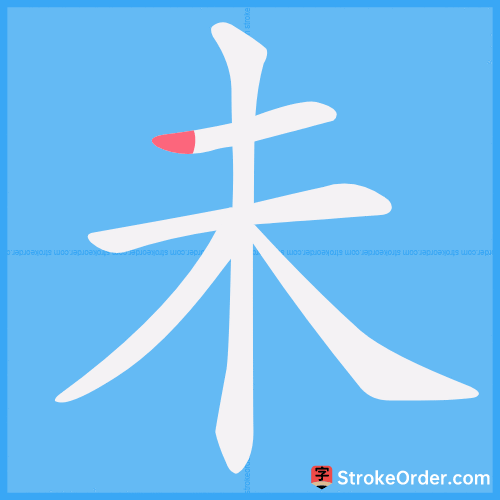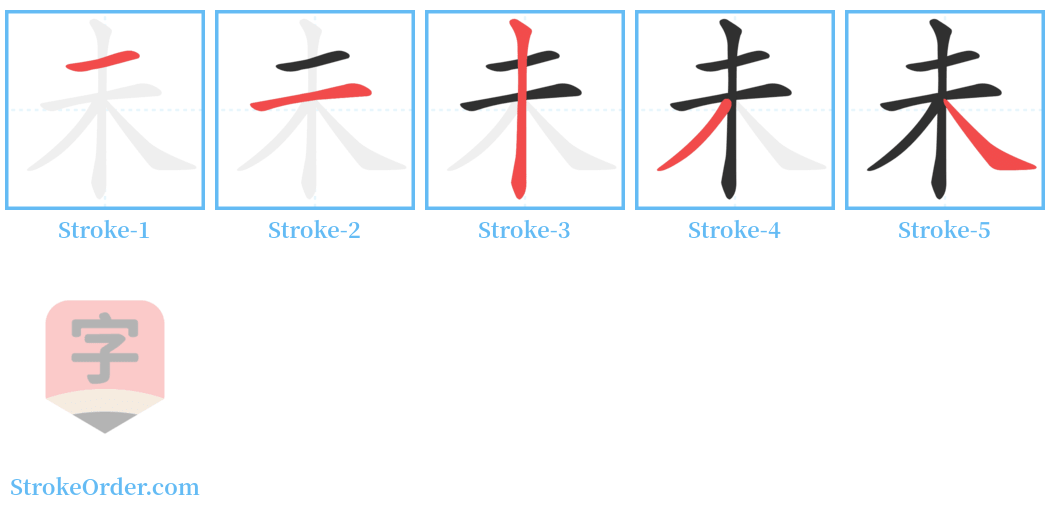未 Stroke Order
Animated Stroke Order of 未

Stroke Order Diagrams for 未

Step-by-Step Handwriting Guide for 未

Learn to Write Chinese Characters with Video Tutorials
Watch the video of writing the Chinese character "未", learn the correct stroke order (笔顺) of the character "未", and master the standard way of writing the character "未".
Free Printable Handwriting Practice with Stroke Order: 未
Printable Writing Practice Worksheet of "未" in Portrait Orientation (Tian Zi Ge)

Printable Writing Practice Worksheet of "未" in Landscape Orientation (Tian Zi Ge)

Information of 未
Pinyin
wèi
Radical
木
Strokes
5 strokes
Usage
★★★★★
Definition
1-3 p.m. / 8th earthly branch / not yet / did not / have not / not
未 [wèi]
1. Not, never, without: 未必 (not necessarily), 未曾 (never), 未来 (not yet), 未尝 (never), 未竟 (not yet completed), 未及 (a. did not have time; b. did not reach).
2. The eighth position in the Chinese zodiac, representing the sheep.
3. Used for timekeeping: 未时 (the time period from 1 PM to 3 PM).
4. Placed at the end of a sentence to indicate a question: "君除吏尽未?吾亦欲除吏。" (Is it true that you have gotten rid of the officials? I also want to eliminate them.)
未 [wèi] (Adverb)
Definition: No; Not. The character "未" negates the past but does not negate the future, which distinguishes it from "不". However, sometimes it can also be used in place of "不".
1. Equivalent to "没有" (did not have), "不曾" (never), "尚未" (not yet).
2. "未" negates the past; "不" negates the future, but "未" can sometimes serve the function of "不".
3. Used at the end of a sentence to indicate a question.
未 [wèi] (Noun)
1. Flavor; later written as "味" (taste).
2. The number 8 in the duodecimal cycle.
3. Used in conjunction with heavenly stems to signify years, e.g., the year 1967 is the Year of Ding Wei in the lunar calendar.
4. Used to signify months, specifically the sixth month of the lunar calendar.
5. Used for timekeeping; referred to as "未刻", meaning the time between 1 PM and 3 PM.
6. Corresponds to the element Earth in the Five Elements.
7. Corresponds to the sheep in the twelve zodiac signs.
8. Represents the future.
未 [wèi] (Adverb)
1. Equivalent to "没有" (did not have), "不曾" (never), "尚未" (not yet).
2. "未" negates the past; "不" negates the future, but "未" can sometimes replace "不".
3. Used at the end of a sentence to indicate uncertainty or a question.
未 [wèi] (Noun)
1. Flavor; later written as "味" (taste).
2. The eighth position in the Chinese zodiac.
3. Used in conjunction with heavenly stems to signify years.
4. Used to denote the sixth month of the lunar calendar.
5. Used to denote time, specifically as "未刻" (the time between 1 PM and 3 PM).
6. Corresponds to the element Earth in the Five Elements.
7. Represents the sheep in the zodiac.
8. Indicates the future.
One's childish disposition remains. / still preserve traces of childishness / still retain childlike innocence
Input Method for 未
Pinyin
wei4
Wubi
fii|fggy
Cangjie
jd
Zhengma
bdko
Four Corner
50900
Unicode
U+672a
Same Pronunciation Characters